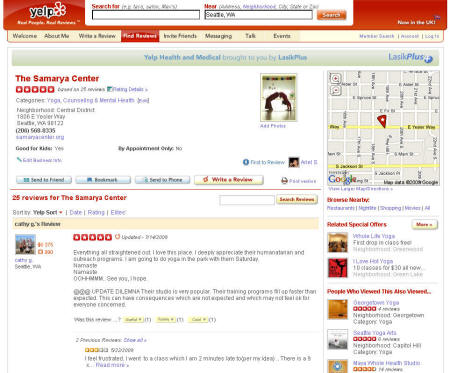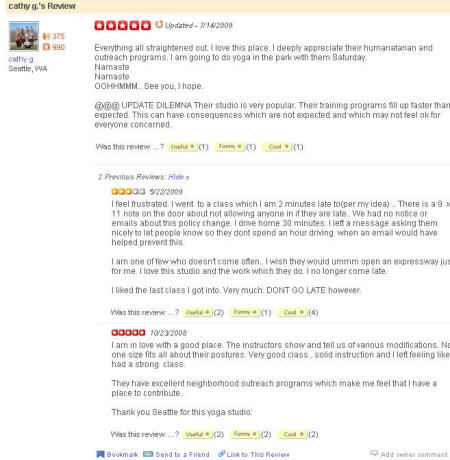Online customer reviews of your fitness, nutrition, yoga or healthy lifestyle business attract new clients, customers and members. Here’s why they matter – and how to get them.
1. Why are online customer reviews so important?
Two reasons:
First, your wellness business will naturally appear more prominently in search results when people search for something like “chicago river north health clubs.”
Why? Because search engines like Google consider online reviews on popular sites when they rank search results.
Second, because what customers say about your business always carries more weight than what YOU say about your business.
It’s the same principle that makes face-to-face word of mouth so valuable.
2. Which sites are most important for online reviews?
The sites that matter most: Google, Facebook and Yelp.
Avoid paid sites like MerchantCircle and those that specialize in listings for thousands of health clubs or chiropractic clinics or wellness centers. These results don’t include objective customer reviews and they are not ranked highly by the search engines.
3. But what if someone says something bad about us?
Better to know than not know. Here’s how to respond to negative online reviews.
Look, if they had a bad experience at your business, you better believe they talked to their friends and coworkers about it! You just didn’t know about it.
So they’re actually doing you a favor by posting it on the web, because now you can easily find out what they’re saying.
Stop worrying about how to shut up people who are legitimately unhappy. Instead, focus on problem prevention.
Here’s a great example of what I mean (click the image to see it full-size):
See, the problem’s that they made a policy change – “no late arrivals” – without communicating it to students who don’t attend every week. Instead of worrying about how to keep this unhappy student quiet—or blaming it on her, which is a very common customer service response—think ahead. If you’re making a policy change, for example, how WILL you communicate it to everyone, not just your most regular attendees?
True, you can’t make everyone happy. But if you’re tone-deaf and thoughtless about how changes affect customers, they have a right to fuss.
Now, the other thing to notice here is that reviews give customers a chance to keep updating their feedback on your business.
In this Yelp example, user Cathy G. is initially very positive in October 2008. In May 2009 she’s frustrated because of a new, poorly-communicated policy. But in July 2009, she reports back that “everything’s all straightened out.”
Click the image to see it full-size:
One last point:
Yes, occasionally a nutty customer will post a totally unjustified rant about your business. Fortunately, nearly all potential customers can easily spot these reviews for what they are. They’ll ignore them because you’ve got plenty of other positive comments from sane customers. Don’t sweat them, and don’t respond in a snarky fashion online.
Now, if a customer complains about a legitimate issue, and you’ve resolved it, it’s OK to post a short, businesslike update apologizing and explaining what you’ve done so that this situation won’t recur. Customers generally understand that businesses aren’t perfect. It’s how they respond when there’s a service problem that makes or breaks their opinion of your business.
And of course, DO NOT call out the customer or blame them for not bringing this problem to you in the first place. Even if they really are psycho liars, calling them this in your response is never a good look. (Yes, we have seen this happen. More than once.)
4. OK, how do we get customers to post reviews?
- First, pick a site to promote to your customers.
We suggest that you start with Google and rotate among the others throughout the year.
- Next, provide a handout to your customers with instructions for how to post a review on that site. Lots of folks will be willing to do it, but won’t know how.
Then, start letting customers know that this is important to you.
You’ll be surprised at how many customers are willing to write a quick review. They just never thought about doing it.
For example, say something casual at the beginning of a class or seminar like “Hey everybody, we’re trying to get lots more online reviews for City Center Wellness on our Google profile. If you can write a quick review, we’d really appreciate it. Here are instructions on how to do it.” (And place a stack of instruction sheets next to the snacks!).
- Train your health coaches, trainers, and healthcare practitioners to mention it to their clients as well.
- If a customer pays your business a compliment verbally or via email or text, as soon as you thank them, ask them if they’d be willing to post that comment in a review on Google.
- If Terms of Service allow it, consider turning a cheap netbook into a “review corner” near the front of your store or facility. Post instructions for how to create and post online reviews.
- Create promotions around online reviews
When allowed by Terms of Service, run promotions that reward people who post reviews. For example, you can offer a free additional month of membership or something else of value. Do NOT enter only the five-star reviews!
Simply tell people to bring in a copy of the review or email you when it’s posted.
In general, no-strings rewards will work better than discount offers. You’ll get a better response if you offer a free smoothie in exchange for each review than you will if you offer 30% off personal training in exchange for each review.
5. Not that WE would do this…but do businesses ever write their own reviews?
Absolutely. You wouldn’t be the first wellness business to write your own glowingly positive review. After all, it’s much easier than leaving it up to your customers, right?
We leave the ethical question up to you. Be aware as well that this is always a violation of your Terms of Service, which can penalize your business. For example, Google suspends Google My Business business listings with fake reviews. Plus, as a practical matter, a single review for a business isn’t usually very compelling, so while it probably won’t hurt anything to do this, it probably won’t help much either. And embarking on a massive campaign to procure lots of phony feedback is a truly terrible idea.
The biggest issue with writing your own reviews is that no matter how hard you try (and no matter how many misspelled words you deliberately introduce) you will never sound like an authentic customer.
Take a few minutes to browse reviews posted on these sites for businesses like yours. You’ll start to notice that the most effective reviews are the ones that were clearly written by customers. They may point out a couple of things you could do better, but their sincerity and appreciation for your business shines through because it’s clearly written in their own words and reflective of their unique situation and experiences.
You’ll get much more bang for the buck if you spend your energies on making it easy for customers to review your business and motivating them to do it – rather than writing the reviews you wish you had.




